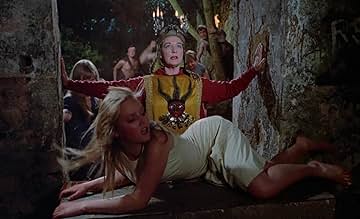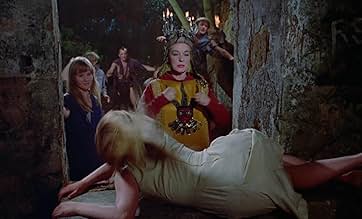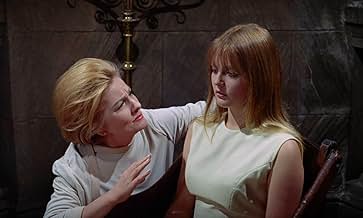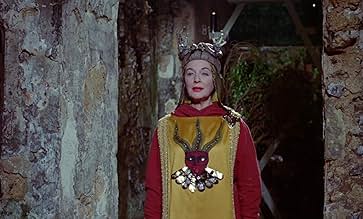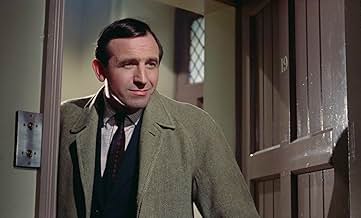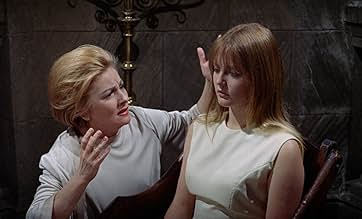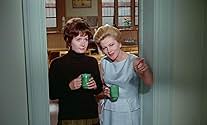Following a horrifying experience with the occult in Africa, a schoolteacher moves to a small English village, only to discover that black magic resides there as well.Following a horrifying experience with the occult in Africa, a schoolteacher moves to a small English village, only to discover that black magic resides there as well.Following a horrifying experience with the occult in Africa, a schoolteacher moves to a small English village, only to discover that black magic resides there as well.
- Linda Rigg
- (as Ingrid Brett)
- Granny Rigg
- (as Gwen Ffrangcon-Davies)
- Mark
- (uncredited)
- Mrs. McDowall
- (uncredited)
- Mr. Glass
- (uncredited)
- Director
- Writers
- All cast & crew
- Production, box office & more at IMDbPro
Featured reviews
Perhaps part of the problem is that Hammer was always so good with their period pieces that there's a lack of truly oppressive atmosphere with this contemporary set tale. After a hell of a start, the film, which could indeed have used a more masterful director like Terence Fisher at the helm, slowly loses its grip.
Joan Fontaine made her last appearance in a theatrical feature here, from then on only acting on TV. The star of Hitchcocks' "Rebecca" and "Suspicion" plays Gwen Mayfield, a teacher who after a traumatic experience in Africa comes to the small English village of Heddaby to instruct at its local school. She'll soon come to suspect that some of the citizens are up to no good...but she'll have no idea just how big the problem is.
The lovely Ms. Fontaine is appealing and sympathetic in the lead, and she receives solid support from an exemplary cast - Kay Walsh, Alec McCowen, Ann Bell, Ingrid Boulting, John Collin, Michele Dotrice, Gwen Ffrangcon Davies, Duncan Lamont, Leonard Rossiter, and Martin Stephens. As could be expected, this is a good looking Hammer production, well designed and photographed and featuring an eerie score composed by Richard Rodney Bennett.
Admittedly, this can't compare to the best that Hammer has to offer, but it remains watchable enough until its finale. It may work better for those who aren't fans of the studio to begin with.
Six out of 10.
One of the lesser known horror movies from legendary British Hammer films, this was also Joan Fontaine's last role. It's a slow and surprisingly tame movie, but well-made and atmospheric. While it's nothing outstanding, it certainly is worth watching. The ending may be a bit of a letdown. I also liked the music score during the opening credits, and some bits of the soundtrack are really good.
Except for the hokey demon in the opening, the first part is nicely understated. Life at the English school seems normal enough even if the business with the dolls is a little unsettling. As a result, we can't be sure what's developing, which for me generates suspense since we know something sinister is afoot but can't be sure what. Frankly, I wish the movie's remainder had remained in this understated vein, with a creepy upshot instead of the wildly misguided finale.
With an actress of Fontaine's caliber, it would have been possible to develop this dark psychological aspect, which, for example, is nicely done at the rest home, but soon gives way to silly high-priestess antics (Bax). I guess Hammer figured audiences expected a big lurid payoff leaving nothing to the imagination, which is just what they provided. Anyway, the film's colorfully set in the English countryside, and smoothly directed by Frankel. But for those of us that believe the most effective horror lies in an aroused imagination, the movie proves an ultimate disappointment.
Visually, The Witches, as with most Hammer efforts, looks great. The scenery and sets are both beautiful and eerie, it's stylishly shot and the lighting helps give off an effectively creepy atmosphere. The music is resolutely haunting and has a thrilling intensity while also having the ability of being intimate when it calls for it.
The script does lack horror and mystery, but flow-wise and structurally it flows well and is decently written, and while the film is reasonably tame by today's standards the atmosphere still has a creepiness and the first half interests and entertains mostly. The direction is very competent in the first half and shows great technical assurance but falls flat in the last thirty minutes. The cast are very good and are the best thing about the film aside from the visuals. Joan Fontaine has been better, but the vulnerability of her character is very deeply felt, Alex McCowan has a lot of fun with his role while Kay Walsh's excellent performance steals the film.
As said, the first half is reasonably strong. It does have its flaws, it does move too slowly in places and the prologue was rather vague and somewhat irrelevant. It's always professionally made and well-acted on the whole, and is intriguing and entertaining, with a great creepy atmosphere and some decent suspense.
However, the second half really disappoints. It gets really tedious, gets increasingly confused, suspense, mystery and horror are non-existent and it dissolves into camp, which I don't think was intended. The film's biggest flaw is the climax, which has to be the worst ever ending for a Hammer film with its inept choreography, even worse dancing and it was just too amateurish to even be considered unintentionally funny.
Overall, good first half, but very bad second half. An uneven film, with a lot of strengths and some big flaws. 6/10 Bethany Cox
Did you know
- TriviaThis was Joan Fontaine's final film, perhaps due to its poor box office reception, though she continued to work consistently in television well into the 1980s (one final project came in 1994).
- GoofsWhen Linda starts dancing in the finale, Tom's position changes between long shots and close-ups.
- Quotes
Gwen Mayfield: Look at this! Stuck full of pins and it's head missing. What do you think it could possible be?
Stephanie Bax: Witchcraft? Somebody having a little dabble? Yes, I would think so. Or did you think I was going to say, no no no, it can't happen here? I bet there are lots of remote spots where remnants of witchcraft are still practiced. Places like Heddaby, in fact. I've often wondered.
Gwen Mayfield: Well, what are we going to do?
Stephanie Bax: Do? Ah.
Gwen Mayfield: Well, I'd like to start by removing those pins.
Stephanie Bax: Yes, we could- Oh, no! Emphatically not! Do you see why? Well, that would mean admitting belief in it all, for ourselves I mean.
Gwen Mayfield: Oh, I see!
Stephanie Bax: I did some articles on witches once. No, not witches, damn them, people who thought they were witches. The psychology of it. It's a sex thing deep down, of course, mostly women go in for it, older women.
Gwen Mayfield: Like, um, Mrs. Rigg, for instance?
Stephanie Bax: Yes. They relish the idea of a secret power, especially when their normal powers are failing. Now, they may believe in it, the point is, do we? What are we giving into if we admit the possibility that a healthy young kid can be put in hospital by mere ill will? That's where it gets fascinating.
Gwen Mayfield: I see, what we admit we believe and what we believe I suppose, could destroy us.
Stephanie Bax: Beautifully put.
- ConnectionsFeatured in Les Archives de la Hammer: Wicked Women (1994)
- How long is The Witches?Powered by Alexa
Details
- Release date
- Country of origin
- Language
- Also known as
- Les sorcières
- Filming locations
- Bray Studios, Down Place, Oakley Green, Berkshire, England, UK(Studio Interiors)
- Production companies
- See more company credits at IMDbPro
- Runtime
- 1h 30m(90 min)
- Aspect ratio
- 1.66 : 1


